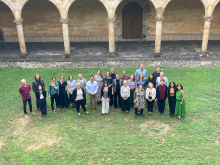The law of Global Value Chains: Theory and Practice at Work
Coordinadores: Shelley Marshall (RMIT University), Hila Shamir (Tel Aviv University, PI ChainGE Lab (ERC)), Guy Mundlak (Tel Aviv University), Judy Fudge (Professor, School of Labour Studies, McMaster University, Canada)
Descripción del encuentro
The workshop will focus on the role of law in Global Value Chains (GVCs) – intricate networks that organize, operate, and impact the world economy. GVCs represent the functional and geographical fragmentations of supply and production, often transferring labor-intensive tasks to emerging economies. Despite being the "central nervous system" of the world economy, scholars emphasize that GVCs don't inherently guarantee development or the distribution of value evenly across the chain, observing power and profit maldistribution, along with adverse effects on local communities, workers, and the environment.
While there are innovative attempts to regulate GVCs, the socio-legal dimension remains under-theorized, with a focus instead on private self-governance. This workshop aims to address this gap by bringing together scholars from various legal fields, disciplines, and national contexts to explore the theory and practice of the Law of GVCs. The workshop will engage private and public law scholars, together with GVC scholars from other disciplines. Following a general discussion of law and GVCs, the workshop will focus on the challenge of labor governance in GVCs.
The focus on labor evolves from the growing repertoire of governance instruments that are used in GVCs governance, eliciting much experimentation and innovation. Systemic violations of workers' rights in lower tiers of GVCs have prompted action across the OECD. Modern slavery and mandatory human rights due diligence laws (MHRDD) require Multinational Corporations (MNCs) to disclose actions addressing forced labor or adopt mechanisms for duty of care and diligence. Transnational litigation attempts by advocacy groups to impose duties on MNCs, though so far, with limited success. Trade initiatives and import controls were introduced by some countries to address forced labor, but these lack remediation for workers. Amid skepticism about top-down regulatory approaches, attention has shifted to bottom-up strategies emphasizing worker participation, voice, and Worker Driven Social Responsibility (WSR). Preliminary assessments suggest positive impacts on working conditions through WSR initiatives, yet challenges of replicability and scalability exist.
The first day of the workshop will introduce the broader discussion of the interaction of different areas of law with GVCs, examining GVCs not merely an economic innovation detached from law, but as an institution that is constituted through law. The second day will examine the proliferation of regulatory approaches and labor governance strategies that serve as important case studies for the intersection of law and GVCs. The two days will create a unique opportunity for a multi-faceted and holistic understanding and assessment of law and GVCs both in theory and in practice.
Nuestra experiencia en Oñati
Our workshop, Law of Global Value Chains: Theory and Practice at Work, brought together approximately 30 scholars from across the globe — spanning five continents — for three days of intense, generous, and truly enriching conversation. We are deeply grateful to the IISL for providing not only a home for our discussions but an environment that inspired deep reflection, intellectual openness, and a spirit of collaboration.
From the moment we began organizing, the support from Malen and the team was outstanding — attentive, responsive, and always one step ahead. The logistics were smooth, the facilities impeccable, and the backdrop of Oñati’s mountains and cloisters reminded us daily that legal scholarship can and should be grounded in community and care.
The unique setting of the IISL clearly shaped the workshop’s success. Participants arrived prepared, engaged, and ready to share work-in-progress across disciplines and legal traditions. The format allowed for real dialogue and space to think slowly — a rare gift in academic life. For many of us, the opportunity to meet colleagues we had been reading and citing for years, often for the first time in person, was both joyful and generative.
We cannot recommend the IISL more highly, and we hope to return with future workshops — and to encourage our colleagues to do the same.
With much appreciation,
Hila Shamir (on behalf of the organizers: Guy Mundlak, Shelley Marshall and Judy Fudge)
Workshop Coordination Team
Avenida de la Universidad, 8
Apartado 28
20560 Oñati (Gipuzkoa) - Spain
T: +34 943 78... Ver teléfono
E: workshop@iisj.es




